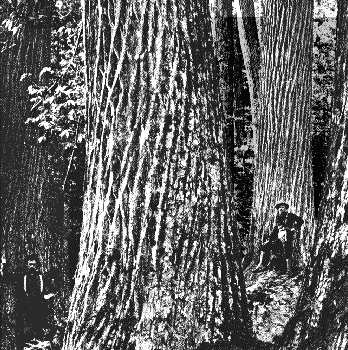Peak Forests
by Mark Robinowitz
Peak Oil and Climate Change
Peak Oil and Climate Change are two facets of the same problem of overshoot, and neither can be mitigated in isolation from the other. Concern about melting glaciers and extinction of charismatic megafauna is less likely to influence governmental energy policies than desperate scrambles to replace depleting fossil energy supplies.
Most projections of future carbon levels ignore the fact that fossil fuels are finite. Focusing solely on climate change ignores the most important question facing humanity -- whether to "spend" the remaining oil on solar panels or battleships (a simplified version of the choice).
Focusing solely on oil depletion leads to destructive policies aimed at increasing liquid fuels production -- “alternative” fuels that can have worse environmental impacts than conventional petroleum, including accelerated climate change.

old growth American Chestnuts, North Carolina, ca. 1900
Desperate Cutting
Peak Oil is creating simultaneous separate incentives for slower and faster forest liquidation.
Peak Oil’s economic impacts have started reducing construction projects, which will slow lumber demand, creating incentives for timberland owners to hold onto their "resources" for a future uptick in the housing market.
However, economic disruptions would also create an incentive for those who own forests to speed up their obliteration to generate cash flow. This would exacerbate the current trends for clearcutting versus selective forestry -- the practices that create the most short term return are those dominant in the industry, while those that create more board-feet in the long run are rarely practiced by corporate forestry.
Past Peak: New Incentives for Deforestation
Most timber corporations own huge tracts of third growth trees that have little value for lumber. Grinding up tree farms into biofuels will create a new market with seemingly limitless potential for forest destruction. Many forest protection activists are aware of how "chip mills" have resulted in massive clearcuts throughout the Southeastern US. Turning tiny trees into liquid fuels that can fuel internal combustion engines will speed up deforestation, which ironically will increase global warming (since deforestation is a massive cause of climate change through carbon emissions and disruption of the hydrologic cycle).
Several generators have been built across the United States that burn wood chips to create steam to generate electricity -- which create a market for trees too small to process into high-quality boards.
This would exacerbate the current trends for clearcutting versus selective forestry -- the practices that create the most short term return are those dominant in the industry, while those that create more board-feet in the long run are rarely practiced by timber barons who must maximize profit for shareholders.
Transforming tree farms into liquid fuels for internal combustion engines poses severe threats to forest integrity due to rapacious demands.
Short-sighted pseudo-solutions will speed up deforestation by turning trees into liquid biofuels, which cannot replace the vast amount of oil used for cars, delivery trucks, freight trains, cargo ships and airplanes.
Many power generators built in the United States in the past two decades burn natural gas, which is past peak in North America. This decline is fueling a demand to burn trees (and wood chips) to make steam to generate electricity. Converting forests into megawatts will create markets for trees too small to process into high-quality boards, making recovery of damaged woodlands virtually impossible.
The ecologist David Pimental estimates that 500,000 acres of managed forests would be required to supply electricity to a city of 100,000 people powered by burning trees. In Oregon, the roughly 3.7 million people would require about 17.5 million acres, less than the amount of actual forestland. Since Oregon is the least populated West Coast state, converting forests into electricity is not the answer to the decline of fossil electricity.
High Diesel Prices Strain Forest Products Industry
Web Editor: Caroline Cornish, Reporter
Created: 11/15/2007 4:15:29 PM
www.wcsh6.com/news/article.aspx?storyid=74851
DURHAM (NEWS CENTER) -- Those who work in Maine's forest products industry say they are getting squeezed by high diesel prices and they're urging both state and government leaders to help.
According to AAA, diesel prices in Maine have gone up more than 60 cents a gallon over the past 2 months.
Tom Cushman, president of the Professional Logging Contractors of Maine, saID that kind of increase puts a huge strain on business. Cushman's company, Maine Custom Woodlands, uses about 3000 gallons of diesel every week. He said he can't just charge customers more because many of them are already locked into long-term contracts.
This Saturday, members of Maine's forest products industry will be meeting with representatives from the governor's office and Maine's congressional delegation to talk about possible solutions.




